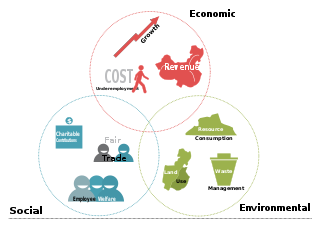Related Research Articles
In economics, a recession is a business cycle contraction that occurs when there is a period of broad decline in economic activity. Recessions generally occur when there is a widespread drop in spending. This may be triggered by various events, such as a financial crisis, an external trade shock, an adverse supply shock, the bursting of an economic bubble, or a large-scale anthropogenic or natural disaster. There is no official definition of a recession, according to the IMF.

In economics, inflation is a general increase in the prices of goods and services in an economy. This is usually measured using a consumer price index (CPI). When the general price level rises, each unit of currency buys fewer goods and services; consequently, inflation corresponds to a reduction in the purchasing power of money. The opposite of CPI inflation is deflation, a decrease in the general price level of goods and services. The common measure of inflation is the inflation rate, the annualized percentage change in a general price index. As prices faced by households do not all increase at the same rate, the consumer price index (CPI) is often used for this purpose.

Marketing is the act of satisfying and retaining customers. It is one of the primary components of business management and commerce.

In economics, an externality or external cost is an indirect cost or benefit to an uninvolved third party that arises as an effect of another party's activity. Externalities can be considered as unpriced components that are involved in either consumer or producer market transactions. Air pollution from motor vehicles is one example. The cost of air pollution to society is not paid by either the producers or users of motorized transport to the rest of society. Water pollution from mills and factories is another example. All (water) consumers are made worse off by pollution but are not compensated by the market for this damage. A positive externality is when an individual's consumption in a market increases the well-being of others, but the individual does not charge the third party for the benefit. The third party is essentially getting a free product. An example of this might be the apartment above a bakery receiving some free heat in winter. The people who live in the apartment do not compensate the bakery for this benefit.
A subsidy, subvention or government incentive is a type of government expenditure for individuals and households, as well as businesses with the aim of stabilizing the economy. It ensures that individuals and households are viable by having access to essential goods and services while giving businesses the opportunity to stay afloat and/or competitive. Subsidies not only promote long term economic stability but also help governments to respond to economic shocks during a recession or in response to unforeseen shocks, such as the COVID-19 pandemic.
An interest rate is the amount of interest due per period, as a proportion of the amount lent, deposited, or borrowed. The total interest on an amount lent or borrowed depends on the principal sum, the interest rate, the compounding frequency, and the length of time over which it is lent, deposited, or borrowed.

Consumerism is a social and economic order in which the aspirations of many individuals include the acquisition of goods and services beyond those necessary for survival or traditional displays of status. It emerged in Western Europe before the Industrial Revolution and became widespread around 1900. In economics, consumerism refers to policies that emphasize consumption. It is the consideration that the free choice of consumers should strongly inform the choice by manufacturers of what is produced and how, and therefore influence the economic organization of a society.
Corporate governance refers to the mechanisms, processes, practices, and relations by which corporations are controlled and operated by their boards of directors, managers, shareholders, and stakeholders.
Brand equity, in marketing, is the worth of a brand in and of itself – i.e., the social value of a well-known brand name. The owner of a well-known brand name can generate more revenue simply from brand recognition, as consumers perceive the products of well-known brands as better than those of lesser-known brands.
In marketing, publicity is the public visibility or awareness for any product, service, person or organization. It may also refer to the movement of information from its source to the general public, often via the media. The subjects of publicity include people of public recognition, goods and services, organizations, and works of art or entertainment.

The triple bottom line is an accounting framework with three parts: social, environmental and economic. Some organizations have adopted the TBL framework to evaluate their performance in a broader perspective to create greater business value. Business writer John Elkington claims to have coined the phrase in 1994.

Corporate social responsibility (CSR) or corporate social impact is a form of international private business self-regulation which aims to contribute to societal goals of a philanthropic, activist, or charitable nature by engaging in, with, or supporting professional service volunteering through pro bono programs, community development, administering monetary grants to non-profit organizations for the public benefit, or to conduct ethically oriented business and investment practices. While once it was possible to describe CSR as an internal organizational policy or a corporate ethic strategy similar to what is now known today as Environmental, Social, Governance (ESG); that time has passed as various companies have pledged to go beyond that or have been mandated or incentivized by governments to have a better impact on the surrounding community. In addition, national and international standards, laws, and business models have been developed to facilitate and incentivize this phenomenon. Various organizations have used their authority to push it beyond individual or industry-wide initiatives. In contrast, it has been considered a form of corporate self-regulation for some time, over the last decade or so it has moved considerably from voluntary decisions at the level of individual organizations to mandatory schemes at regional, national, and international levels. Moreover, scholars and firms are using the term "creating shared value", an extension of corporate social responsibility, to explain ways of doing business in a socially responsible way while making profits.
Ethical consumerism is a type of consumer activism based on the concept of dollar voting. People practice it by buying ethically made products that support small-scale manufacturers or local artisans and protect animals and the environment, while boycotting products that exploit children as workers, are tested on animals, or damage the environment.
Managerial economics is a branch of economics involving the application of economic methods in the organizational decision-making process. Economics is the study of the production, distribution, and consumption of goods and services. Managerial economics involves the use of economic theories and principles to make decisions regarding the allocation of scarce resources. It guides managers in making decisions relating to the company's customers, competitors, suppliers, and internal operations.

Rebranding is a marketing strategy in which a new name, term, symbol, design, concept or combination thereof is created for an established brand with the intention of developing a new, differentiated identity in the minds of consumers, investors, competitors, and other stakeholders. Often, this involves radical changes to a brand's logo, name, legal names, image, marketing strategy, and advertising themes. Such changes typically aim to reposition the brand/company, occasionally to distance itself from negative connotations of the previous branding, or to move the brand upmarket; they may also communicate a new message a new board of directors wishes to communicate.

Anti-consumerism is a sociopolitical ideology. It has been defined as "intentionally and meaningfully excluding or cutting goods from one's consumption routine or reusing once-acquired goods with the goal of avoiding consumption". The ideology is opposed to consumerism, being a social and economic order in which the aspirations of many individuals include the acquisition of goods and services beyond those necessary for survival or traditional displays of status.
A target market, also known as serviceable obtainable market (SOM), is a group of customers within a business's serviceable available market at which a business aims its marketing efforts and resources. A target market is a subset of the total market for a product or service.
In economics, a spillover is a positive or a negative, but more often negative, impact experienced in one region or across the world due to an independent event occurring from an unrelated environment.

A brand is a name, term, design, symbol or any other feature that distinguishes one seller's good or service from those of other sellers. Brands are used in business, marketing, and advertising for recognition and, importantly, to create and store value as brand equity for the object identified, to the benefit of the brand's customers, its owners and shareholders. Brand names are sometimes distinguished from generic or store brands.
Social accounting is the process of communicating the social and environmental effects of organizations' economic actions to particular interest groups within society and to society at large. Social Accounting is different from public interest accounting as well as from critical accounting.
References
- ↑ "Professionalism vs Commercialism: The Association Between Non-Audit Services (NAS) and Audit Independence". Journal of Business Finance & Accounting. 28 (5–6): 563–594. 2001. doi:10.1111/1468-5957.00386.
- ↑ "Commercialism and Universities: An Ethical Analysis". Journal of Academic Ethics. 8: 1–19. 2010. doi:10.1007/s10805-010-9109-9.